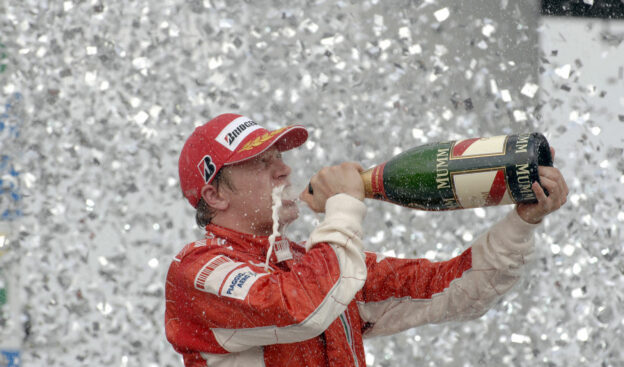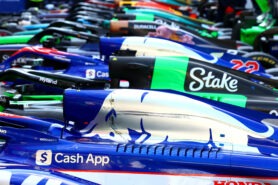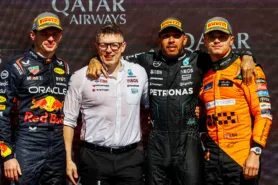Most Thrilling F1 World Championship Comebacks

The 2024 Formula One World Championship looks to be going down to the wire, with McLaren's Lando Norris doing everything in his power to hunt down reigning champion Max Verstappen. The Flying Dutchman has romped to the title in each of the last three campaigns, with the most recent two of those triumphs being two of the most dominant campaigns the sport has ever seen. When the 27-year-old reigning champ won seven of the first ten races this season, a fourth straight title looked like a formality, but Norris and his McLaren team had other ideas.
While Verstappen has been without a victory since the tenth race of the campaign back in June, Norris has since gone on to claim two victories including at the most recent Grand Prix in Singapore. He has dragged himself back into title contention and currently sits 52 points behind the championship leader with just six races remaining. Thanks to the substantial championship lead, the latest F1 betting odds still make Verstappen a narrow -190 favorite, with Norris narrowly behind him at +130.
But despite the reigning champion's current lead at the summit of the standings, the title is by no means a foregone conclusion, as the bookies' odds show. Norris' McLaren-Mercedes is an absolute rocketship and by far and away the fastest car on the grid, while Verstappen's Red Bull isn't the dominant force it once was. As such, narrowing the gap could still yet happen, bringing with it the greatest World Championship comeback in history.
There have been plenty of other title chases over the years, with the underdog overthrowing the heavy favorite. Here are the best of them.
Kimi Raikkonen Takes Advantage of Lewis Hamilton's Disastrous Mistakes
Kimi Raikkonen's 2007 championship triumph is one of the most dramatic comebacks in F1 history. In his first season driving for Ferrari after making the move from McLaren to replace the outgoing Michael Schumacher, the Flying Finn faced fierce competition from reigning champion Fernando Alonso and rookie Lewis Hamilton who were the two drivers at his former team. Mid-season, Raikkonen found himself trailing behind the McLaren drivers by a huge margin, with many not even considering him as a contender.
However, Raikkonen's determination and consistency began to shine through as he clawed back points race by race. Back-to-back victories in France and Germany announced his return and he didn't let a retirement in the next race in Germany deter him. Throughout the final seven races, the Finnish star managed to secure a spot on the podium, and victory in Belgium left him with a chance with three races to go.
His third-place finish in Japan all but secured the title for Hamilton, with the Brit needing to win just one of the two final races to claim the championship. However, disaster struck for the rookie. He beached his car in the pitlane in the penultimate race of the campaign to hand Raikkonen victory, while a gearbox issue in the season-ending Brazilian Grand Prix sent him plummeting down the field. Raikkonen went on to win both, overturning a huge 17-point deficit to be crowned champion.
Sebastian Vettel's Ascent
Sebastian Vettel's 2010 comeback is a testament to resilience and strategic brilliance. Driving for Red Bull Racing, the young German driver faced intense competition from a host of top-tier drivers, including Fernando Alonso, Mark Webber, and Lewis Hamilton, all of whom were still alive in the championship battle right up until the end of the campaign. Despite Alonso leading the quartet into the final race of the season, it was Vettel's Red Bull that was the fastest car on the grid, similar to how Norris' McLaren is faster than Verstappen's car this term.
Back in 2010, the majority of Vettel's season was marred by inconsistent performances and mechanical issues. However, victories in Japan and the penultimate race in Brazil kept his hopes alive.
At the season-ending Abu Dhabi Grand Prix, Vettel delivered a masterclass in racing under pressure. Championship leaders Alonso and Webber - Vettel's teammate at the time - both opted to box early and got stuck behind Renault's Vitaly Petrov in the process. The Russian's car was slower than the title challengers throughout the majority of the circuit, but it was far quicker on the straights, and that prevented either of them from overtaking.
That opened the door for Vettel, and he duly won from pole position, while Alonso and Webber finished seventh and eighth respectively, handing the first of four straight titles to the young German star.
James Hunt's Triumph Against All Odds
James Hunt's 1976 championship win is a story of taking advantage of every single opportunity possible. The Mclaren driver was miles behind championship leader Niki Lauda, who had dominated the early part of the campaign in his Ferrari. However, he suffered a near-fatal crash at the German Grand Prix which dramatically swung and blew the title race wide open.
Hunt seized the opportunity, winning that fateful day in Germany before claiming another win in the Netherlands a fortnight later to make up ground in the championship. Lauda made a miraculous return at the Italian Grand Prix but was unable to stem the tide. Hunt won back-to-back races in Canada and the United States to take the title fight down to the end-of-season Japanese Grand Prix.
Heading into the Fuji Speedway showpiece, Lauda led Hunt by three points. However, he refused to race amid torrential rain, putting the value of his life above championship glory. Hunt meanwhile opted to race, and he secured the third place finish he needed to win the title, finishing just one point ahead of his greatest adversary.
✅ Check out more posts with related topics:













LAST 3 F1 Fan COMMENTS